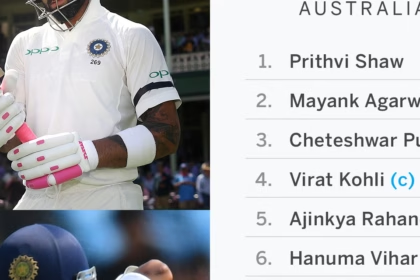Australia and India: An Epic Duel Amidst the Pandemic
In a year marked by the Covid-19 crisis, Australia and India prepare for a showdown at the Adelaide Oval, the same venue where their previous encounter began in 2018. The familiarity of the scoreboard and the iconic Moreton Bay trees at the northern end of the field provide a sense of continuity, a hallmark of test cricket. This will be the first Test day/night for India away from home, promising an even more memorable encounter than the previous ones between these two cricket powerhouses, who have maintained constant contact over the last two decades. The series itself is an achievement, considering the circumstances. Despite the financial influences driving the 12 test encounters between Australia and India since 1999, a number similar to Australia’s Ashes series against England in the same period, players and spectators experienced moments of uncertainty about the realization of the series. During the difficult months of March, April and May, when the sports world came to a standstill, the possibility of the series not taking place was real. Recently, the obstacles focused on the organization of the series, despite the good will between Cricket Australia and the BCCI. CA’s interim chief executive Nick Hockley and chairman Earl Eddings were primarily faced with the challenge of finding an entry point for the plane carrying the visiting team. Initial plans to land in Perth were moved to Adelaide, then to Brisbane, before Sydney, Canberra, the New South Wales government and the SCG Trust took the lead. Negotiations with the Queensland government generated anxiety. Even after the arrival of the Indians, a Covid outbreak in Adelaide could have disrupted the series. For a long time, the Adelaide Oval was scheduled to host at least one and possibly two test matches. Adelaide Oval curator Damian Hough has had to deal with rock concerts and changes to football matches, but this year he prepared a test pitch with a Christmas parade instead of the Sheffield Shield games.Hough also mentioned that the preparation of the Australian team was a success and that they would stick to the game plan. Practice sessions in the center of the field are a competitive advantage for the Australians, according to Tim Paine. The team had the opportunity to practice in the center field of the Adelaide Oval for three consecutive nights, which they consider a significant advantage. Kohli’s adaptation, who did not participate in the practice match at the SCG, will be crucial for the result in Adelaide. This will be Kohli’s only test match in the series, before Ajinkya Rahane takes over the captaincy in the remaining three matches. The Australians, with players like Pat Cummins, Josh Hazlewood, Mitchell Starc, and Nathan Lyon, have been successful in dismissing Kohli early in the last two series. Overcoming that phase is key, as Kohli has shown he can be a danger to any attack.One thing we’ve learned with Covid is to be more in the present. We like to plan months in advance. We still had plans, but we had to live in the moment a little more.
Damian Hough
Paine added that, although they have plans to counter Kohli, they have different strategies and a diverse attack with different angles and speeds. Instead of concerns about Covid protocols, border restrictions and financial impacts, tactical discussions and plans for the series are a respite. Paine, who values his test career, does not feel “bubble fatigue” and enjoys the current situation.Everyone has big plans to get the best players out, but that’s why they’re the best, they can adapt, they can change with what you’re doing, and Virat is certainly one of the best players, if not the best player in the world.
Tim Paine
After a year full of challenges, the clash between Australia and India promises to be a vibrant sporting event, especially at a time when many in the world remain confined by the pandemic.Absolutely not. I love it, to be honest. I don’t think this hub has been as strict as the IPL or the one in England. I sleep very well at night; my children are at home, which is good in a way, but I certainly miss them. But I sleep better here and feel fresher here than at home, so life in the hub could actually make me play longer, if anything.
Tim Paine







